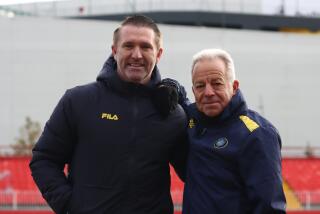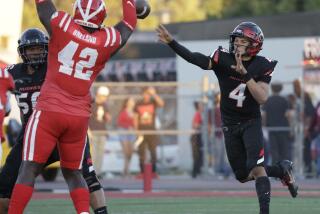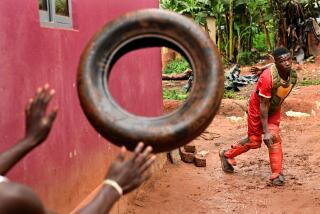Saba’s Heart in Homeland : Football: The game is important to the Laguna Hills fullback, but he has more worldly concerns.
- Share via
LAGUNA HILLS — Marwan Saba has taken his football career from zero to 60 in an extremely short time.
Saba, a junior fullback from Laguna Hills High School, was only 6 when his family migrated to the United States in 1978 from Libya, where his father, a Palestinian, had resided for 25 years.
Besides speaking no English, he had never seen a football game.
“I played soccer back home in Libya,” he said. “So we came (to the United States), and one day when I was about 9, I turned on the TV and there was a football game on. I had never seen it before--it looked like they were just hitting heads. The next year I was playing.
“I was fast back then, a lot faster than all the other kids and the (Pop Warner) coach said, ‘You’re going to play running back.’ I said, ‘Great, tell me what to do.’ I was just running--I didn’t understand the game at all, didn’t know the impact of what I was doing. I don’t even remember my whole first year in Pop Warner because I was so nervous. But from then on it’s history.”
Saba’s life is not centered around football, however. Although he has not been to the Israeli occupied West Bank in more than 11 years, and never even lived there, he and his family still actively participate in the struggle that began when Israel declared itself a state in 1948.
His father, Yacoub, left Lydda (now Lod), about 20 miles from Jerusalem, when the Israeli army occupied the West Bank during that year.
“They expelled all the city, with the adjacent city, Ramla, by military order,” Yacoub Saba said. “We had to leave in one day, and the weather was hot, as in Southern California. We were not allowed to take anything, only animals--what you can carry only. We lived for several days under the trees. Me and two brothers, a little more than 18 years old, had been prisoners of the Israelis for three days.
“I saw the people on the streets, I asked the officer, ‘What is going on?’ and he said, ‘None of your business.’ I sneaked and left him, went to my house and found nobody there. I told the officer in front of my house, ‘OK, but we want to stay--we want to abide by your laws--we are civil people, not military people.’ He said, ‘No, you are not allowed. Anybody who stays here, we will shoot him.’ ”
Yacoub Saba and his family traveled to Gaza, which, at the time, was still under Egyptian control. The family stayed there for five years, then moved to Libya, where he raised his family for 25 years, until coming to the United States in 1978.
Marwan Saba, 17, remembers flying back and forth to see relatives in the West Bank. “The intifada (uprising) was about two years old. You had to carry a card--we had a horrible time going in and out,” he said. “They made you sit for hours, go through all this paper work. Our main goal is to go home someday, when it does become Palestine.”
Saba said his father had been active in the Palestine Liberation Organization and had been one of the first members of Al Fatah, the main guerrilla faction of the PLO. Yacoub Saba disagrees, however.
“We were active, but not in the military,” he said. “We raised money for food, medicine for the refugees. I am not a military man--I know the people but not the military. I was a volunteer--I’ve never taken any money (for my efforts). The PLO is like a government, it is a government in exile.
“We still do the same here--the love is very strong.”
Marwan Saba’s love for football is strong, too.
“There’s nothing like football,” said Saba, a 5-feet-8 and 175 pounds. “There’s so much emotion and intensity in a game, it’s electrifying.
“What I love most is when I’m dead tired and coach keeps giving the ball to me--that’s when I’m at my best, because I’m so in tune with the game. I can feel what the defense is doing. I’d love to carry the ball on every play of the game.”
Saba has carried the ball 161 times this season for four touchdowns and 733 yards, a 4.6-yard average.
“He’s been hurt in two games, but played anyway,” Laguna Hills Coach Steve Bresnahan said. “And other than the games when he’s been hurt, he’s carried the load of our offense.
“Marwan gets what we call ‘tough yards’--inside tackles. He’s getting hit as soon as he gets the ball. He does a great job of when he first gets hit, he keeps his feet moving, which allows him to get extra yards. Most backs would probably just go down.”
“My parents were dead set against me playing, at first,” Saba said. “My dad is the most unathletic person on the face of the earth. And my mom would come to games and say, ‘Oh, they’re all over my son.’ But now they’re very sports oriented.”
Saba said he has not thought much about playing football in college.
“My main emphasis would be to get a good education,” Saba said. “I play football mainly for fun. When I started, it was just something to do after school.
“When I’m on the football field, when I practice, I go 100% every play. Winning is everything to me--I don’t accept losing. I guess I’m a poor loser.
“If the opportunity to play college ball is there, I’ll take it, but there are more important things.”
Such as returning to his homeland.
“I’ve been in countless demonstrations,” said Saba, who as president of the Ram Allah, a Palestinian youth group, is planning a trip to the West Bank next year. “Since I was a kid--I used to pose as a dead kid in the street and they’d write (slogans) around me.
“I have a bumper sticker on my car that says ‘Palestinian Statehood Now.’ Someone left a note on it--very derogatory.
“There are always confrontations with Israelis. Here, they don’t have as strong ties with Israel. The Palestinians that were born here worry me--they haven’t felt it.”
Some of Saba’s relatives are still in the West Bank. “It’s horrible,” he said. “They’ll be in their houses for a couple of weeks--they can’t leave, the phone lines are closed.
“Let’s say I throw a stone . . . they blow up my uncle’s house.
“The people are afraid. We had a second cousin die. My dad’s cousin’s son was playing around a demonstration and was shot. He was 11.
“They call us the terrorists, but in history class I’m learning the Americans did the same thing when they fought for independence.”
More to Read
Get our high school sports newsletter
Prep Rally is devoted to the SoCal high school sports experience, bringing you scores, stories and a behind-the-scenes look at what makes prep sports so popular.
You may occasionally receive promotional content from the Los Angeles Times.






